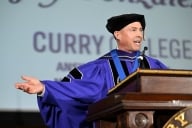You have /5 articles left.
Sign up for a free account or log in.
Hendrix College’s president, Bill Tsutsui, was sitting with his senior leadership team one day, figuring out how to make use of the empty Arkansas campus during winter breaks -- and a thought struck him: career preparation.
It was perhaps quite a relevant idea given the heaps of criticism that liberal arts institutions such as Hendrix endure about whether they are teaching their graduates the necessary skills to land a job.
Tsutsui’s career center staffers brainstormed a program of sorts years ago, it turns out, so in January the college rolled out the inaugural initiative for its sophomores, what it dubbed Career Term.
It works like this: for a couple of days during winter break, the college brought back almost 50 of its second-year students and gave them workshops on base-level career-search skills -- résumé writing and job interviewing, dressing professionally and finding an internship.
Officials brought in Hendrix alumni to talk with the attendees. Tsutsui himself taught a crash course in personal branding.
“I’m always surprised that across the board I meet plenty of folks whose résumé could still use some work,” Tsutsui said in an interview. “Or they don’t put themselves forward in the strongest possible way. Possibly it’s just the natural modesty of people, for some folks, that it’s too egotistical or too much bragging. But I just think that aspect of self-presentation, broadly defined, how you comport yourself in professional situations, on paper and electronically, people still have a lot to learn about it.”
Hendrix is touting Career Term as the first initiative in the country that uses the college winter break to coach students in job training. While only serving part of its sophomore class this year, the college intends to offer the program to the entire class by January 2020.
Some liberal arts institutions, in response to public perception that their traditional model isn’t viable or demanding, have broken away, creating programs far outside the liberal arts, around the sciences or technology.
Tsutsui said he doesn’t see a need to ravage a liberal arts curriculum or add majors such as cybersecurity. He maintains that there are many ways for liberal arts students to succeed, or even exceed their peers who are being trained in vocational programs.
Students outside the liberal arts likely will have their job training woven into their studies, Tsutsui said. “But there’s lots of ways to get to the same goal,” he said, such as Career Term, a separate program for these types of skills.
“I have a feeling in 30 years we’re going to look back and laugh at the boom in cybersecurity,” he said, adding that skills such as job interviewing won't disappear -- they're timeless for students.
The narrative that students steeped in the liberal arts can’t succeed is wrong, said Michelle Weise, senior vice president for workforce strategies at Strada Education Network.
Strada researches employment trends among college graduates. It has published studies suggesting students aren’t confident they’ll find a job after college, and that the students who take a position they’re overqualified for tend to remain “underemployed.”
Weise said liberal arts students simply need to show employers how their skills translate to the work force. A campaign such as Career Term can help identify early what they need -- whether that’s help communicating or a couple of extra classes outside their majors, she said.
Integrating the lessons early in a student’s college career -- the second year, which is neither too late nor too soon -- also benefits them, Weise said. Doing so their sophomore year could jump-start students’ interest in their career centers, which have struggled to attract student attention over the last several years, Weise said. According to one Strada report, 40 percent of students never visited their career centers.
“I don’t think a one-off is enough, but the students will get a good enough taste of it,” Weise said of Career Term. “Sustaining that with the career services office is important. Most younger students have no understanding of the opportunities available through their career services.”
Three years ago, Hendrix reviewed its career services after problems with student engagement, Tsutsui said, and found that large amounts of staff time were used on one-on-one meetings with students. Career Term is a way to disseminate the basics en masse and forge a connection with the career center and alumni, he said.
“The alumni piece is a really big one,” Tsutsui said. “If you can make that connection during Career Term, that can be golden.”








